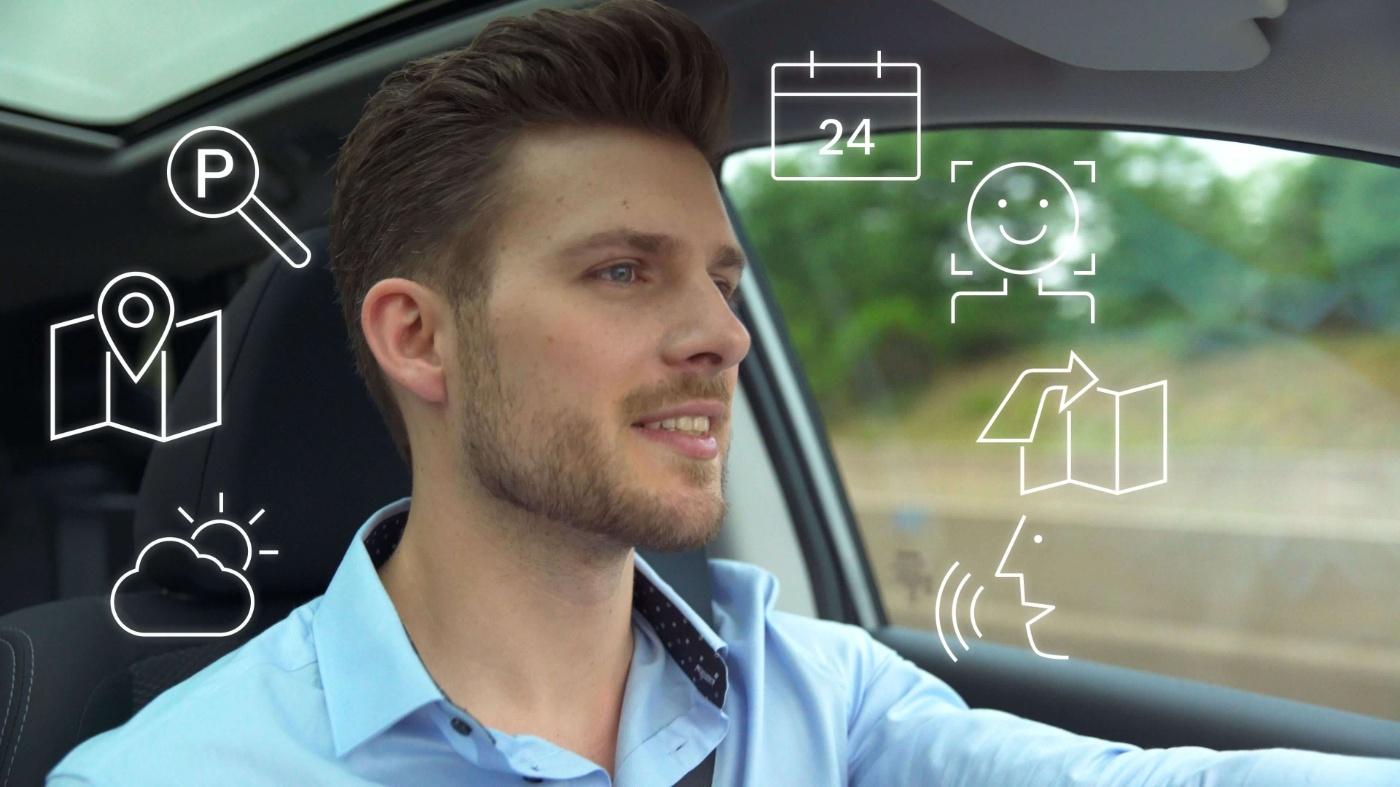
Urban Mobility
Voice assistant as front passenger…?
Siri, Alexa, Cortana and Bixby – nowadays voice assistants are pretty much everywhere in our daily lives. They can be activated from a smartphone or a computer, and control lights and fridges in smart homes. And they long ago found their way into modern cars – a cross between a butler and a language student. Photo © 2021 Mercedes-Benz AG
With a voice assistant at your side, you don’t have to switch anything on by hand, or even open an app or look for a function. That’s ideal for car trips, because motorists should not be distracted. Many people are not aware that a glance at their smartphone while doing 130 km/h means traveling 36 meters without looking where they are going, and at 50 km/h it is still 14 meters. According to a study by the Allianz Zentrum für Technik (AZT) from 2018, almost 75 percent of German motorists are regularly distracted when they use GPS, turn on the air-conditioning or take a phone call without using the hands-free system. Surveys in other countries have produced similar results. The experts at AZT calculated that driver distraction is a factor in around one in ten traffic fatalities. This is where a voice assistant can help. A study by Capgemini found that half of the world’s motorists already used a voice assistant in 2019. Three quarters of them used it most of the time to play music and for navigation. But other popular uses included organizing vehicle maintenance appointments and food deliveries. And the technology is catching on: nearly all motorists would like to be using a voice assistant by the end of 2022, according to the study. However, the authors noted that some aspects require further optimization for the occupants, because only about 30 percent of users rated their experiences with their talking assistants as especially good. Sixty percent would like to see improvements such as using voice commands for interior climate-control or to book immediately available mobility services and garage appointments.

Voice assistants are here to stay. They’re becoming an indispensable part of how people experience their cars and make their mobility safe.Henrik LjungströmManaging Director Capgemini Deutschland
Voice assistants are becoming more intelligent
Until now, you couldn’t speak to your voice assistant the way you would normally talk. The first and second generations of assistants had a problem because the driver had to give clear commands and use particular words. The following generation to these systems no longer needs rigid statements, but understands natural speech – including accents and English dialects. When the driver says, “I’m hungry,” the system starts searching for a restaurant. It’s also possible to put two questions or requests in one sentence. Feedback such as “I don’t understand,” or “I’m sorry, I can’t help you with that,” in response to perfectly normal questions are now a thing of the past. And thanks to artificial intelligence, the voice assistant also learns and thinks. Every interaction improves the user profile – for each individual driver. If the driver wants to call “Chris,” the assistant from Bosch looks for contacts with this name and takes the location and the time of day into account. Early in the morning, “Chris” is probably a workmate, whereas in the evening it’s more likely to be a friend. The system makes a choice independently and then checks whether it’s correct. In the afternoon, on the way home from the kindergarten, it recognizes when a child is on board and can suggest a children’s radio show. The whole system still functions even when the car is offline. A hybrid variant from Continental uses the classical on-board voice control in parallel with a cloud-based version. Bosch’s infotainment system is sufficiently powerful to take over other jobs when the car is offline. This enables a wide range of functions in tunnels, or in rural spots with no radio reception or foreign countries when you can’t connect to the internet. And the days are gone when a voice assistant reacted to only one name. Bosch now allows drivers to call their assistant anything they want.

The best of both worlds
Daimler’s Mercedes-Benz User Experience (MBUX) is a platform that controls vehicle information and infotainment using “Hey Mercedes” on board. So you only have to say, “Hey, Mercedes, how much fuel is there in the tank?” and the digital butler will immediately tell you the remaining distance to empty. MBUX interprets “I’m hot,” as a request to turn the heating down. BMW’s Intelligent Personal Assistant (IPA) is also compatible with voice assistants like Amazon’s Alexa. That has two advantages: the customer is probably familiar with Siri, Alexa & co., and these powerful voice assistants already offer an almost unlimited range of services. The disadvantage lies in connecting with vehicle functions. Here the automotive industry has a clear advantage with its own developments. The supplier Continental manages to combine the best of both worlds. Its system can be coordinated with those of other providers. For example, while in the car drivers can access information, apps and files from the office, or launch applications in their smart home. Škoda customers have “Laura” in their cars, while outside the car they can use Alexa or Google Home to find out how much fuel or battery charge they have left, or where the vehicle is parked. It only remains for the car to learn the art of digital small talk.